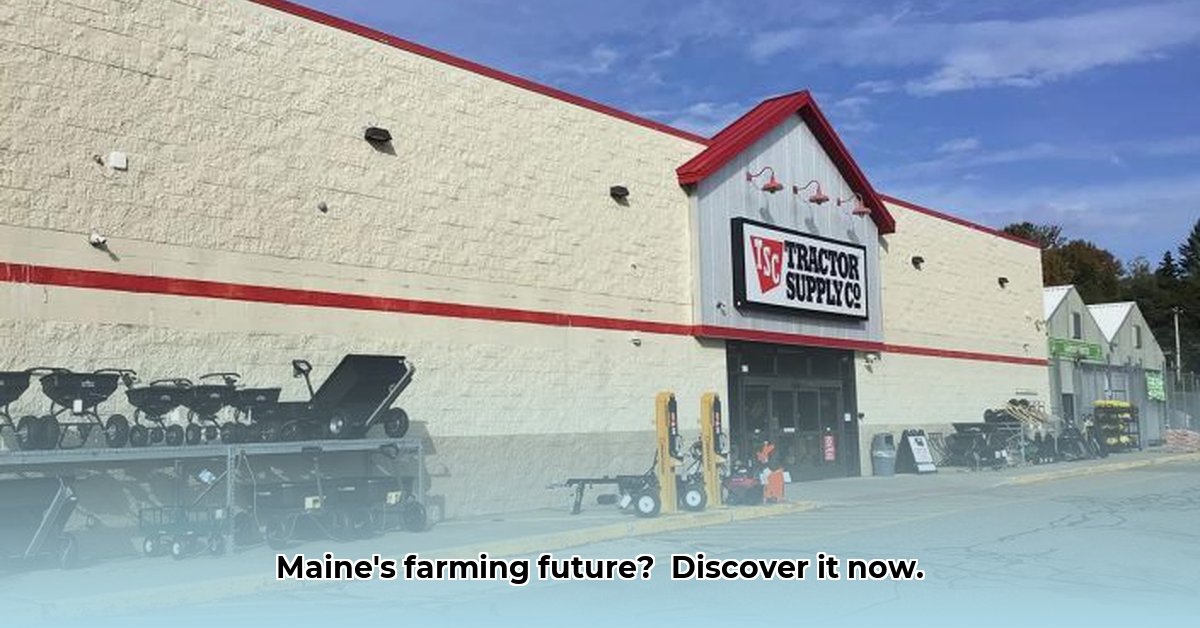
Understanding the Opportunity: Supporting Sustainable Agriculture in Maine
Ellsworth Tractor Supply (ETS) possesses a unique opportunity to significantly contribute to the growth of sustainable agriculture in Maine. Their existing inventory of seeds, animal feed, tools, and equipment forms a foundational base upon which to build a robust program supporting environmentally conscious farming practices. By strategically expanding their offerings and partnerships, ETS can become a vital resource for Maine farmers seeking to adopt sustainable methods. For more information on farm equipment, check out this helpful tractor buying guide.
What ETS Already Offers
ETS currently stocks numerous products beneficial to sustainable farming. High-quality animal feed contributes to healthier livestock, reducing waste and improving overall animal welfare – a key element of sustainable agriculture. Efficient tools and equipment contribute to maximized crop yields while minimizing resource consumption, such as water and fertilizer. These existing offerings represent a solid foundation for further development.
Expanding ETS's Green Initiatives: Opportunities for Growth
Significant expansion of ETS's contribution is achievable. Adding organic pest control options, water-efficient irrigation systems, and renewable energy solutions for farms directly addresses the rising demand from environmentally conscious farmers committed to reducing their environmental footprint.
Strategic partnerships with Maine universities, agricultural extension services, and government agencies represent a powerful synergy. Joint workshops and educational materials would empower farmers with the knowledge necessary to implement sustainable practices. This collaborative approach strengthens ETS's brand, attracts new customers, and benefits Maine's agricultural sector as a whole. This multi-pronged approach fosters a win-win scenario for all stakeholders.
Actionable Steps for a Greener Maine: A Phased Approach
The following plan outlines how ETS can fully embrace and promote sustainable farming practices in Maine:
Phase 1: Building a Foundation (Year 1)
Targeted Marketing Campaign: Immediately launch a focused marketing campaign highlighting the existing products that already support sustainable farming practices. Emphasize the environmental benefits – reduced water usage, efficient feed utilization, fuel-efficient tools – rather than simply product features.
Direct Farmer Engagement: Actively engage with Maine's farming community. This includes attending local agricultural events, sponsoring workshops, and actively collaborating with farmer organizations. The primary goal is to understand farmer needs and build strong relationships.
Phase 2: Expanding the Green Initiative (Years 2-3)
Strategic Product Line Expansion: Based on feedback from Phase 1, expand product offerings to include explicitly "green" products; such as organic fertilizers, water-saving irrigation technologies, and renewable energy solutions (solar panels, wind turbines).
Strengthen Educational Partnerships: Formalize partnerships with Maine's universities and agricultural extension services to provide comprehensive workshops and high-quality educational materials on sustainable farming techniques. This collaboration fosters trust and provides farmers with crucial support.
Phase 3: Becoming a Sustainability Leader (Years 4-5 and Beyond)
Dedicated Sustainability Brand Development: Create a clear and compelling brand identity focused on sustainable agriculture. This includes a dedicated website section, special packaging for sustainable products, and a consistent message emphasizing ETS's commitment to environmental responsibility.
Supply Chain Transparency Initiatives: Increase transparency throughout the supply chain, highlighting the sourcing of sustainable and ethically produced goods. This fosters consumer trust and strengthens brand reputation.
Continuous Improvement and Assessment: Regularly review and refine sustainability efforts through continuous feedback from farmers, industry experts, and environmental organizations. Stay abreast of relevant research and regulatory changes.
Addressing Potential Challenges and the Regulatory Landscape
Challenges exist. Competition from other suppliers necessitates a strong marketing strategy articulating ETS's commitment. Educating consumers about the environmental and economic benefits of sustainable agriculture is an ongoing process. Securing reliable sources of sustainable products requires diligent effort.
Compliance with Maine's environmental regulations is paramount. ETS must ensure adherence to all applicable laws and regulations, prioritizing products and practices that meet the highest environmental standards. Maintaining transparency in sourcing and product certifications builds trust and demonstrates genuine commitment.
Key Strategies Summary: A Collaborative Approach
| Stakeholder | Short-Term Actions | Long-Term Goals |
|---|---|---|
| Ellsworth Tractor Supply | Targeted marketing; farmer outreach; product expansion | Dedicated sustainability brand; transparent supply chain |
| Maine Farmers | Access to educational resources and workshops | Adoption of sustainable practices; increased profitability |
| Maine Consumers | Information on sustainable farming & product benefits | Increased demand for and availability of sustainable products |
Ellsworth Tractor Supply has a significant opportunity to foster a more sustainable future for Maine agriculture. By implementing these strategic steps, ETS can evolve from a simple supplier to a vital partner in building a thriving and environmentally responsible agricultural ecosystem. The commitment required is substantial, but the long-term environmental and economic rewards will be equally significant.